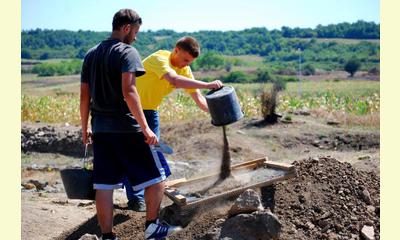|
|
Culture of Peace though Tourism in Kosovo
un article par Liliana Sofia Romao Mota
The reconstruction process from a post-conflict
phase should be considered in a comprehensive and
holistic prospective. It should consider new ways
of exploring the tangible and intangible cultural
heritage and the promotion of sustainable tourism
development practices. An interesting unique
experience for this was set up by the OSCE
Mission in Kosovo during the last year. It takes
into consideration ethnic communities and
marginalized groups, freedom of expression,
freedom of religion, gender and equality and
cultural heritage protection. The project creats a
new multi-ethnic archaeological youth camp in
Ulpiana, the extensive and ancient roman and
byzantine archaeological site in Kosovo and one
of the most important Roman settlements within the
Balkan peninsula (see www.osce.o
rg/kosovo/82202.

click on photo to enlarge
The project brought together istitutions like OSCE
mission, the Ministry of Culture, Youth and
Sports, the archeological Institute in Pristina,
the Museum of Kosovo and local and regional youth
association from South-Eastern European and many
places in Kosovo to meet and join a two-weeks camp
programme and visiting the most important cultural
heritages sites in Peje, Prizren and Novo Brdo.
It supports the youth camp on inter-community
dialogue, post-conflict
management and cultural heritage protection. It
also supports the national policies development
on these issues, and monitors their activies for
their compliance with the Declaration of the Human
Rights, particularlly the 27th article "Everyone
has the right freely to participate in the
cultural life of the community, to enjoy the arts
and to share in scientific advancement and its
benefits".
For Kosovars, in my personal view, these kind of
experiences are very worthwhile, considerin that
they are still "rebuilding their roots" from the
isolation and tough moments that they passed
though during the wars. The seminars that take
place in Ulpiana help people to undestand their
own historical common ground which at first
impression is not that evident. In Kosovo there
exist eight ethnic groups. Albanians are the
majority and about 20-25% are minorities like
Kosovars-Turkish, Kosovars-Serbs, Askali, Roma,
Montenegrins, Bosnians, Croats and Egyptians.
Thoughout this peaceful exercise all the groups
get to know each other's impressions and
stereotypes. They share their positive and
negative experiences that they face living in a
society that just came out of war and where
certain minorities do not have national
recognition. I personally found it very
interesting to see that this youth generation is
willing to struggle for their rights and to find a
compromisse on all these issues with deep roots,
by doing an exercise of finding out similarities
instead of differences.
|








|
DISCUSSION
Question(s) liée(s) à cet article:
How can tourism promote a culture of peace?,
* * * * *
Commentaire le plus récent:
Why tourism?
Can tourism be seen as an instrument to achieve complicity between people’s minds?
“There is nothing better that connects two people’s mind than a good conversation” The above quote could be used to describe the effect which tourism has on people. Like a great conversation, tourism could be said to play a vital role amongst people all over the world. It fosters communication in all its senses, intercultural dialogue and mutual understanding.
In today’s world it is evident that there is a shortage of moral or ethical values amongst people across the different nations in this world, resulting in a globalised world lacking these morals and ethical values. Ignorance, the failure to consider the needs of others, and selfishness are a few of the ways which hinder us from embracing diversity and a common human perspective, which would result informal empathy, internal moral compassion, tolerance of differences, historical consciousness and interpretation. The above mentioned features are intrinsic, inherent and can be found in the practice of tourism.
Tourism has been emphasized as one of the most effective instruments which continue to tackle to tackle social and economical poverty, as well as encourage the culture of peace practice amongst people. In looking at the UN architecture, one is able to see the growing implications which the tourism sector has on the world and world policies. . ... continuation.

|
|









